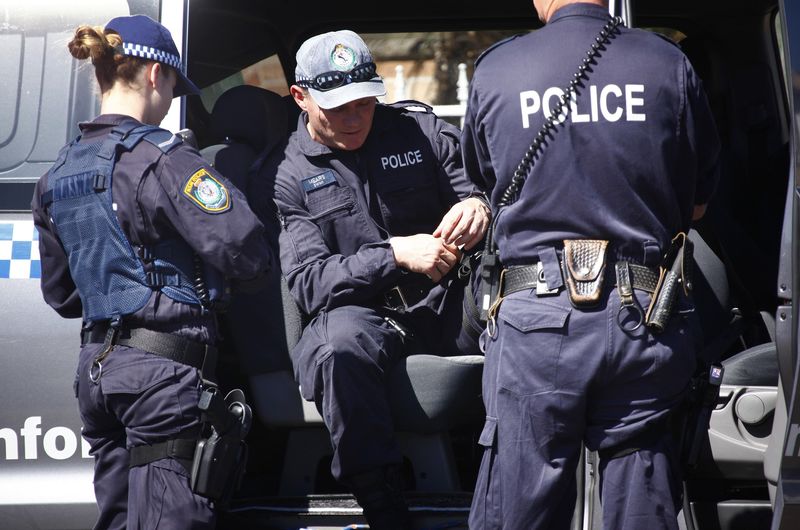* Teenager attacked police accountant last Friday
* Experts say tough govt policies pushing some youths to extremism
* Ex-PM Abbott upped security spend, passed tough anti-terror laws
* Youths arrested for planned WWI commemoration attack
By Morag MacKinnon
SYDNEY, Oct 4 (Reuters) - The Australian government's focus on national security and the war on terror to tackle Islamic extremism, rather than social cohesion and inclusion, has helped create an environment for radicalised Muslim youth to emerge in disproportionate numbers, experts say.
Authorities in Australia are grappling with a rise in violence perpetrated by teenagers at home as well as battling to halt the flow of those who are attempting to travel to Syria to fight with Islamic extremists.
The murder of a police accountant in Sydney on Friday by a boy of Iraqi-Kurdish descent is the latest in a spate of attacks linked to Islamic extremism. Farhad Khalil Mohammad Jabar, 15, was shot and killed by police at the scene. ID:nL3N12300I
"We're punching above our weight," Greg Barton, Chair in Global Islamic Politics at the Alfred Deakin Institute said of Australia's Islamic extremist activity.
Belying a population of 24 million, with just 2 percent Muslim, and the vast geographical distance between Australia and the Middle East, the disturbing trend of disaffected and violent Muslim teens in a nation known for social stability is perplexing.
The government's emphasis on dealing with national security issues and policing is a critical issue, however, says Anne Aly, associate professor at Curtin University.
"A lot of countries look at it more primarily as a social issue, with national security implications and so the primary efforts have been in building community resilience and working with communities, rather than dealing with law enforcement."
Eight years ago, Aly warned authorities that Muslim children as young as six were showing signs of being disaffected and cut off from the broader community.
Those Muslim children were growing up in homes and neighbourhoods where the overwhelming narrative was about the war on terror and whose parents felt the weight of community and media pressure, she said.
Australia's political rhetoric and "the most punitive and comprehensive" anti-terror legislation of all Western countries also contributed, Aly added.
LACKING CO-ORDINATION
Under former Prime Minister Tony Abbott, Australia ramped up security spending by more than A$1 billion ($700 million) in the past two years and introduced tough laws including banning citizens travelling to conflict zones such as Syria and Iraq, while making monitoring of domestic communications easier.
The government says the new laws have helped thwart attacks, including one allegedly planned for World War One commemorations in April. Around a dozen teenagers have been arrested for that and other planned extremists acts, with Farhad the second teenager killed after carrying through with an attack on police.
A staunch ally of the United States and its battle against Islamic militants, Australia has been on heightened alert for attacks by home-grown radicals since last year.
Deakin's Barton says many of the reasons that push youths in Australia to extremism are a mystery.
"We don't know, for example, why at the moment in America there is less of a problem with young Muslims being radicalised and recruited into Islamic State than there is in Australia."
While Islamic community leaders, the government and police say progress has been made in countering emerging radicalisation, all say there must be better coordination.
Samier Dandan, president of the Lebanese Muslim Association, one of the country's most influential Muslim organisations, says there has been "no true consultation" with the government and community leaders are frustrated and jaded by the process.
He's hopeful new Prime Minister Malcolm Turnbull, who replaced Abbott last month, will engage more effectively.
"What we're hearing, we like, but what we want to see is practical engagement, practical programs, a change in policy, a change in engagement," Dandan said.
Deakin's Barton agrees.
"The only time I think we can say that we are doing as much as we reasonably can do is when we're as good at getting alongside young people and befriending them - investing time in their lives - as Islamic State is," Barton says.
"They are more enthusiastic and more committed and, it would appear, harder working than we are." ($1 = 1.4198 Australian dollars)
<^^^^^^^^^^^^^^^^^^^^^^^^^^^^^^^^^^^^^^^^^^^^^^^^^^^^^^^^^^^ Timeline of Australian Islamic radicalism
ID:nL3N12403O
^^^^^^^^^^^^^^^^^^^^^^^^^^^^^^^^^^^^^^^^^^^^^^^^^^^^^^^^^^^> (Editing by Lincoln Feast and Rachel Armstrong)
